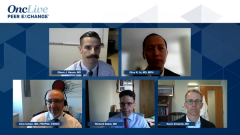
Clinical Presentation of Basal Cell Carcinoma
Richard Bakst, MD, and Ezra Cohen, MD, FRCPSC, FASCO, explain what the typical clinical presentation of basal cell carcinoma will look like in a patient.
Episodes in this series

Glenn J. Hanna, MD: Great. Hello and welcome to this OncLive® panel discussion titled, “Advances in Nonmelanoma Skin Cancers.” My name is Dr Glenn Hanna from the Dana-Farber Cancer Institute in Boston, Massachusetts. My clinical practice focuses on head and neck malignancies broadly, which does include nonmelanoma skin cancers that occur in the head and neck region. I’m privileged to be joined today by a multidisciplinary panel of colleagues to join in this discussion. We have Dr Ezra Cohen, Dr Richard Bakst, and Dr Kevin Emerick, and they can each introduce themselves. Dr Cohen?
Ezra Cohen, MD, FRCPSC, FASCO: Thanks, Glenn. I’m Ezra Cohen from UC [University of California] San Diego. I’m a medical oncologist with an interest in head and neck cancers, including nonmelanoma skin cancers since they often occur in that area.
Glenn J. Hanna, MD: Dr Richard Bakst.
Richard Bakst, MD: Hi, I’m Dr Richard Bakst, I’m a radiation oncologist and associate professor at the Icahn School of Medicine at Mount Sinai in New York, and I specialize in the treatment of head and neck cancers with radiotherapy.
Glenn J. Hanna, MD: And Dr Kevin Emerick.
Kevin Emerick, MD: I am Dr Kevin Emerick, I’m a laryngologist head and neck surgeon at Massachusetts Eye and Ear at Massachusetts General Hospital in Boston, and my clinical practice focuses on melanoma as well as nonmelanoma advanced head and neck skin cancers.
Glenn J. Hanna, MD: Great, thank you, gentlemen. Today we’re going to discuss diagnosis and management of nonmelanoma skin cancers, particularly basal cell carcinoma, but the bulk of our discussion will be around cutaneous squamous cell carcinoma. We’ll start with basal cell. We’ll also review some clinical case scenarios to illustrate how these 2 malignancies are managed in the multidisciplinary setting. We’ll start with basal cell carcinoma. The first thing I wanted to allow the group to comment on, starting with you, Dr Bakst, is about the clinical presentation of basal cell. As a radiation oncologist, it seems as though perhaps a lot of these patients start out in dermatology clinics or skin cancer clinics. How is it that you end up seeing patients? How do they typically present? And how are you engaging the multidisciplinary team?
Richard Bakst, MD: Basal cell carcinoma can present in a spectrum of fashions, and a lot of the dermatologists that often see the patient before they get to someone like myself, may see the early disease that is very amenable to in-office procedures. However, often by the time they get to me, they’re usually more advanced, especially in the head and neck area, where they could be ulcerative and require multidisciplinary care. And by the time they get to me, they’re often seeing my colleagues in medical oncology to consider systemic therapy and or head and neck surgery to consider a resection as needed.
Glenn J. Hanna, MD: Great. Dr Cohen, I was just curious, what members of the multidisciplinary team are you engaging when you’re thinking about a complex basal cell carcinoma case?
Ezra Cohen, MD, FRCPSC, FASCO: Yes, as Rich alluded to, certainly the surgeons are quite involved, dermatology is too in many cases, although if the medical oncologist is getting involved, the disease has probably gone beyond what typical dermatologists would be able to handle. Then the radiation oncologists, and of course, as medical oncologists, we’re beginning to think about the utilization of systemic therapy.
This transcript has been edited for clarity.




































